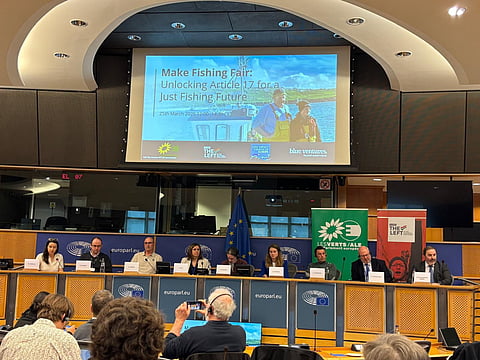

Photo: Low Impact Fishers of Europe
Small-scale fishers from across from across the EU and the UK gathered in the European Parliament last week to make the case for fairer access to fishing rights, calling on EU institutions to reform a system they say is tilted in favour of industrial fleets.
The meeting, held within the European Parliament on 25 March, brought together fishers, policymakers, and advocacy groups to shine a light on structural disadvantages faced by low-impact, coastal fishing communities. Organised by the Low Impact Fishers of Europe (LIFE) and conservation group Blue Ventures, the event was co-hosted by MEPs Isabella Lövin (Greens), Emma Fourreau, and Luke Ming Flanagan (The Left). Several other MEPs, including Paulo Do Nascimento Cabral (EPP) and Eric Sargiacomo (S&D), as well as European Commission representatives, also participated.
The timing of the discussion is significant, as it coincides with the EU’s public review of its Common Fisheries Policy (CFP), open for consultation until 21 April.
LIFE argues that the current system under the CFP works in favour of large fishing companies, making it harder for smalle-scale fishers to survive economically, particularly as stock closures continue for key species such as Baltic cod and Atlantic pollock. While targeted fishing for these species has been halted, by-catch is still permitted, an inconsistency flagged by both Swedish and Irish delegates at the event.
"The disproportionate allocation of quotas based on historic track records favours large industry players, and transfers between multinational fishing companies across different Member States complicate the identification of ownership structures, increasing the opacity of the system," LIFE argued in a press release.
“Today, the species that sustain our diverse small-scale fisheries have significantly declined, and even when stocks are abundant, as in the case of bluefin tuna, quota distribution remains opaque and unfair,” said Gwen Pennarun, President of the Low Impact Fishers of Europe.
The Common Fisheries Policy (CFP), last reformed over a decade ago, already contains a little-used provision that could address these issues, LIFE argues.
Article 17 of the CFP mandates the use of transparent, objective criteria - including environmental and social factors - when allocating fishing opportunities. However, this rule has rarely been enforced effectively, participants argued.
“I was deeply involved in developing the principles of Article 17 in the CFP, and it's clear that the expectations have not been met by the member states," said MEP Isabella Lövin (Sweden) during the event.
"Large, unselective trawlers continue to dominate our fisheries, while coastal communities and low-impact fishers aren’t getting the preferential access they were promised. Ten years later, I have to say, I’m really disappointed with the results," Lövin added.
Meanwhile, MEP Luke Ming Flanagan (Ireland) argued that action is needed by European member states in order to ensure this aspect of the CFP is implemented in practice.
“Full and effective implementation of Article 17 requires more than the use of transparent and objective criteria by Member States when allocating fishing opportunities. It requires concrete incentives for low impact fishing practices that make fishing opportunities genuinely accessible in practice, and not just in theory," he said.
Participants called for a binding EU-wide implementation plan to ensure fair and sustainable quota distribution. Such a move, they argued, would help restore balance to the fishing industry while advancing environmental and social goals.
MEP Emma Fourreau (France) closed the event by urging EU institutions to seize upcoming opportunities, including the United Nations Ocean Conference and the forthcoming EU Ocean Pact, to prioritise small-scale fishers and support a shift toward more sustainable practices.
“For years, fishing opportunities have been unequally distributed, promoting the interest of industrial fishing to the detriment of small-scale fishers and the marine environment. This has to change,” she said.
